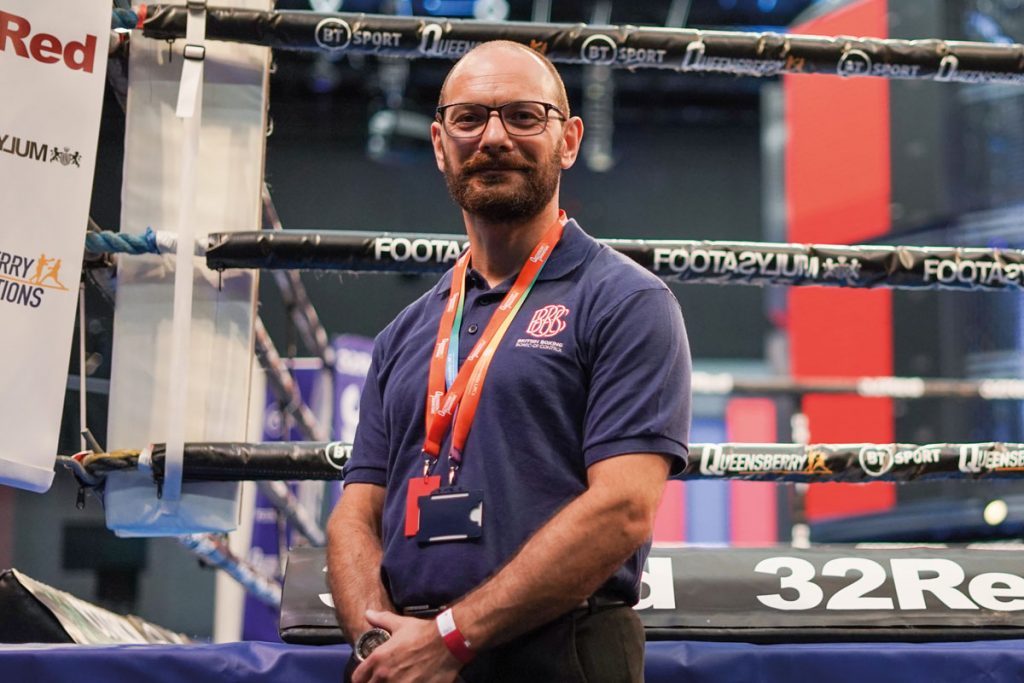Working life: Boxing clever in a pandemic

Dr Elliott Singer on a night by the ring (in a TV studio)
Friday 3pm
One of my interests since a young age has been boxing. Being a ‘boxing doctor’ has enabled me to not just watch but be part of some great fight nights. To undertake this role, you must be a boxing fan as you will be asked to cover shows both large and small. These typically occur on Friday and Saturday nights.
I live near the venue, but because of the pandemic, I have to isolate in a hotel for a day like the other officials and boxers. I arrive and we all undergo a pre-fight Covid swab. Like all regulators, the British Boxing Board of Control (BBBC) is trying to ensure the sport is as safe as possible during the pandemic. This day-in-the-life is rather different from my usual.
Friday 4:30pm
I have my test. Someone in full PPE is sticking a swab repeatedly down my throat until I gag, but otherwise it’s fine. I spend the afternoon in my hotel room, linked into my practice system as I remotely conduct my normal afternoon surgery. If anyone needs a face-to-face assessment, my colleagues at the practice will provide this. By the time I finish my list, path links and prescriptions, it is dinner time. I meet the other three doctors and some of the officials for a socially distanced dinner and catch-up.
Saturday 9am
I have a day in a hotel room with little to do for the fight night. Fortunately, as a GP and LMC medical director, there is always work so I spend the morning catching up on emails and reading documents. It’s probably not the way most of us would want to spend our Saturday.
Saturday 12pm
Covid antigen test result comes back negative, so I’m cleared to cover the show.
Saturday 1pm
There are five bouts this evening, so all 10 boxers need a pre-fight medical. The main reason is to ensure they have no acute illnesses and are fit to box. This is in addition to the annual medical they all have, which is a comprehensive health assessment. Boxers are exceptionally fit athletes and it is unusual to come across problems at this stage but we need to be very cautious, especially if they have been trying to reduce their weight rapidly or suffering with headaches or acute illness.
Saturday 4:30pm
Time to transfer to the venue. As a medical officer for BBBC you are part of a multidisciplinary team including anaesthetists, paramedics, consultants in various specialties from nutrition to neurosurgery and other GPs. There is always at least one anaesthetist and a paramedic team at a show in case of a serious head injury. Fortunately this is rare, and the sport is organised to make it as safe as we can.
Today is an unusual situation as the fights are taking place in a TV studio. Once all the boxers have completed their pre-contest medicals, I familiarise myself with the layout of the venue, check the medical room and rehearse the exit strategy with the paramedics in case we need to rapidly transfer an injured boxer.
Saturday 7:30pm
Normally the crowd at a show creates an electrifying atmosphere. But tonight we have no crowd, so at first it feels like a boxing gym. Anyone in the immediate vicinity of the ring is required to wear PPE – except the boxers. The ring is cleaned between bouts. Entry to the ring area is limited and the BBBC officials are in an area separated by screens. Despite the lack of an audience, it is still an entertaining evening. The four doctors are in two teams, one to remain ringside and the other to do post-contest medical checks. I’m in the latter team. After each bout, we give the boxers their medical, which includes a neurological assessment. I am needed to suture a cut above an eye and advise a boxer on his perforated eardrum. All the other boxers are fine.
Saturday 11pm
We have cleared the final boxers. I’m home by 11.30pm – a typical finish time for a boxing doctor.
Profile: Dr Elliott Singer
Location
Waltham Forest, east London
Roles
GP partner, trainer, a GPSi in minor surgery and LMC medical director. Also a medical officer for the British Board of Boxing Control
Hours worked per week
Approximately 20 hours in clinical work and four hours training. Each month, more than 32 hours on LMC work and around eight hours on boxing
Pulse October survey
Take our July 2025 survey to potentially win £1.000 worth of tokens

Related Articles
READERS' COMMENTS [6]
Please note, only GPs are permitted to add comments to articles











This is cool. It’s also amazing how much respect you gain, outside of NHS surgery doors. You feel self worth, excitement, purpose and fun again. Think we all could do with a punch bag.
.
It’s just not the same behind closed doors.
Odd sterile environment, no atmosphere, elite boxers only.
If none too bright consenting adults want to batter each other to within an inch of their lives to satisfy the bloodlust of a braying mob, then crack on: regulated and legal boxing is the least worse option.
Don’t try and tell me that its not a blood sport, however.
Pull the other one.
Just encourage the boxers to make sure that they are absolutely happy to donate their organs should it come to it and give a courtesy call to the local Neuro-ITU.
They’ll be glad of the work because I’m pretty sure that they’re kicking their heels right now.
I speak as one who has provided medical cover on numerous occasions to boxing events.
Not through choice.
More people die through fishing accidents than boxing.
Slobbering Spaniel
https://www.youtube.com/watch?v=QT9BeGNnCqw